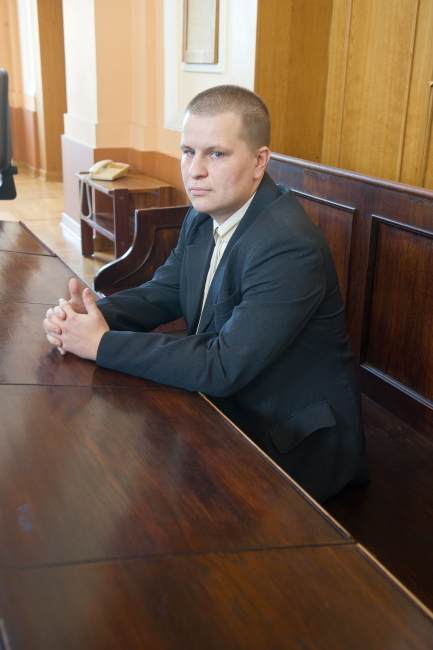
The defendant on Friday: photo - PAP/ Grzegorz Michalowski
Under the terms of the sentence of “restriction of liberty”, he will not be allowed to change his permanent address without permission from the court, until the 15-month period has elapsed.
The case of Robert Frycz (who waived his right to remain anonymous, as is a defendant's right in Poland), had raised controversy in Poland, with the 26-year-old's supporters arguing that the charge threatened the concept of freedom of speech.
Frycz claimed from the outset that his web site, antykomor.pl, was “satirical.”
While the court found Frycz guilty of insulting the president, the defendant was however acquitted of the separate charge of falsifying identification documents.
Visitors to Frycz's site can play computer games with such titles as 'Komor Kiler' (Komor Killer), in which users can fire virtual vegetables at the president.
The defendant's trial in Piotrkow Trybunalski, central Poland, followed a May 2011 raid on Frycz's flat in nearby Tomaszow Mazowiecki by the Internal Security Agency (ABW), during which Frycz's computing equipment was confiscated.
The action prompted the Warsaw prosecutor's office to file a complaint regarding alleged abuse of power by the ABW, although the agency was ultimately not brought to court.
Antykomor.pl initially went offline but was subsequently reactivated on a foreign server.
The charge of insulting a head of state endures from the communist era.
A 2005 case drew considerable international interest when the editor of a satirical newspaper, Jerzy Urban (himself a prominent veteran of Poland's communist party) was fined for insulting Pope John Paul II, head of the Vatican state.
President Bronislaw Komorowski tried to distance himself from this month's trial, claiming he was unaware of ABW's plans for the initial raid.
The president's office stated that “during the Polish People’s Republic, [Komorowski] took to the streets to defend freedom of speech.
“He was repressed because of it, and his views haven’t changed since,” said presidential advisor Tomasz Nalecz.
“I will not comment on the judgement,” he said, Friday afternoon, saying the judiciary is independent in Poland.
“This judgement has been made under the majesty of the law, although I am not enthusiastic about this situation,” he added.
'Chilling effects'
“The ruling raises negative consequences and a chilling effect on freedom of expression,” Dorota Głowacka, a lawyer at the human rights NGO, the Helsinki Foundation told TOKFM radio.
“Other people, out of fear of the consequences, may refrain from vigorous criticism of the head of state. Now, they will think twice for fear of initiating criminal proceedings.”
“There is considerable doubt as to whether the provision for penalties against insulting the president is in line with constitutional guarantees of freedom of speech,” said the Helsinki Foundation's lawyer. (pg/nl)
source: IAR/PAP